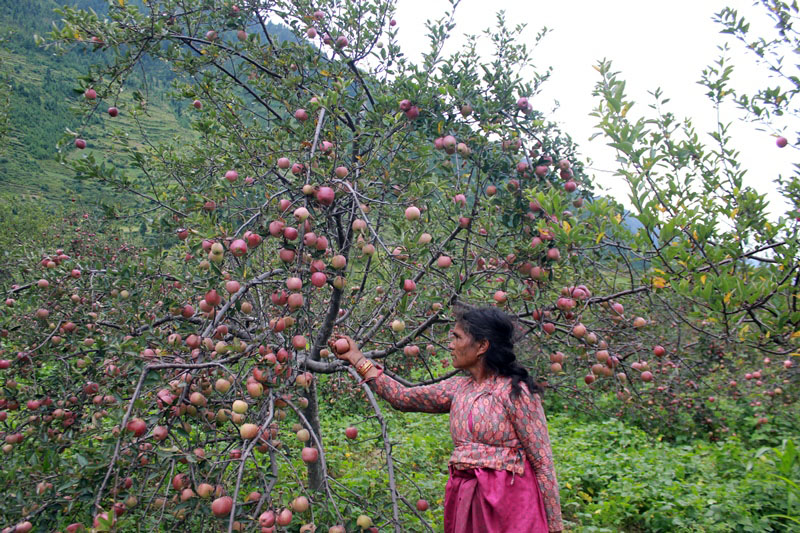
Jumla: Apple production has increased this year in Jumla district, famous for apple cultivation.
Ganesh Adhikari, Chief of District Agriculture Office, Jumla informed that 18,000 metric tons of apples have been produced in the current financial year. According to him, 12,000 metric tons of apples were produced last year.
Despite the increase in apple production, the farmers are worried because they are not getting a fair price. Out of the 18,000 metric tons currently produced, 9,000 metric tons of apples have been sent to Nepalgunj and other markets. But the farmers say that apples are not getting a fair price.
Businessmen were buying apples at Rs 50 to 55 per kg during the season and selling them at Rs 67 to 70 per kg. But now the farmers are forced to sell apples at a much lower price than that.
Dharamsingh Kathayat, an apple trader of Chandannath Municipality-8, Jumla, complained that organic apples from Jumla were delivered to Surkhet, Nepalganj, Dang, Butwal, Narayangadh and Kathmandu but did not get a fair market price.
“I bought apples at Rs. 50 per kg and delivered them to Nepalgunj at Rs. 60 per kg with transportation costs,” he said, “but I was forced to sell them at Rs. 30 per kg.”
He said that due to the lack of cold storage in Kohalpur, apples could not be protected and even though it was cheaper than letting them rot, they had to sell them. Kathayat said that he was in trouble because he was not getting the price even when he brought organic apples of the famous Jumla from the cold store. Apple picking starts in July, August and October in Jumla. But the season ends after November.
Birendra Dangi of Tatopani Rural Municipality-2 Jumla said that even during this unseasonal time, it could not get a good price and even consumers did not understand the importance of organic apples produced in Jumla. Dangi says that after the wholesaler told him not to take the apples unless he gives them at 30 per kg, he is now sitting on the pavement and selling them.
Kamal Khatri of Sinja Rural Municipality-1 Jumla is also suffering from the same fate. According to Khatri, the 12 metric tons of apples that the three brought to Nepalganj were not getting the price. He said, “We Nepalese look at our own products and we get hung up on foreign products mixed with pesticides. I realized that this is our biggest weakness.”










